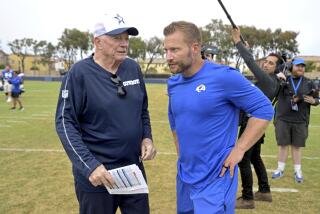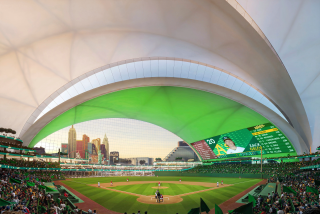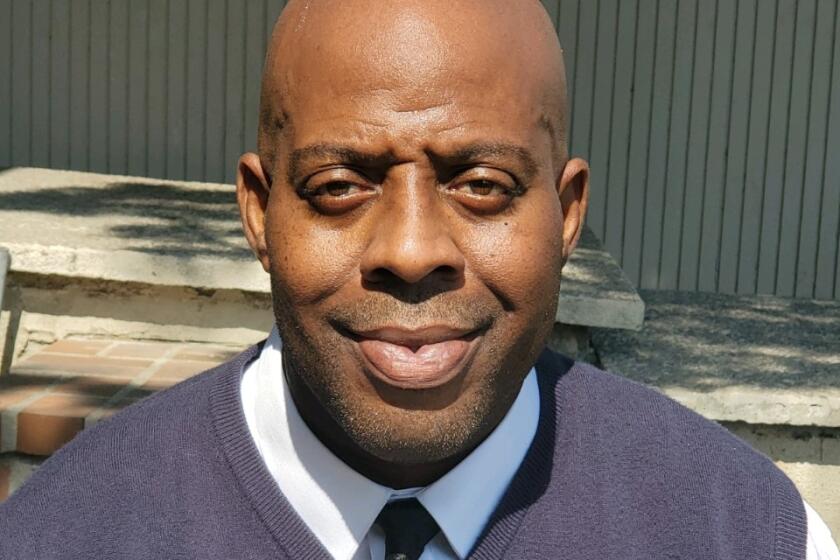Industry NFL plan clears major hurdle
Since the Raiders and Rams left Southern California after the 1994 season, several developers have come forward with grand but ultimately unrealized plans for bringing the NFL back to Los Angeles.
Plans have been floated for stadiums in Carson, downtown Los Angeles, Anaheim and Pasadena’s Rose Bowl. But at least for now, the proposal attracting the attention of state and local officials is developer Ed Roski Jr.’s plan to build an $800-million NFL stadium near the junction of the 57 and 60 freeways in the City of Industry. Roski’s plan cleared a significant political hurdle this week when the project’s main opponent -- the city of Walnut -- agreed to drop a lawsuit aimed at killing the plan.
By quelling at least most of the local concerns over the stadium and gaining the backing of most surrounding cities, Roski has gotten further than some other NFL dreamers.
But football fans should not get their hopes up quite yet.
Even if Roski can clear the remaining legal and zoning thicket, it remains unclear whether such a large project -- which would include retail and office space, as well as practice fields and banquet facilities -- could get construction loans amid the credit crunch. (This issue has stalled several other mega-projects in Southern California, including the Frank Gehry-designed Grand Avenue development in downtown Los Angeles.)
Another big issue is naming rights, which would be a major source of new revenue for the stadium. Amid the recession, companies have shown little interest in big naming contracts at stadiums, including new NFL venues in Dallas and New York.
And then there’s the question of whether a team can be persuaded to move to L.A. John Semcken, a vice president at Roski’s Majestic Realty, has said that he hopes to have a team committed to the new stadium as early as next year.
But some NFL watchers said that is unlikely, given that much of the National Football League’s efforts in the coming months will be focused on avoiding a lockout or strike, as the current players’ collective bargaining agreement expires after the 2010 season. If there is a work stoppage, it might further delay the NFL’s return to the nation’s second-largest media market. The league would be facing sharply declining revenue if the season were to be curtailed or postponed.
In an interview with The Times last month, Roski said that he and his company “are determined to do it.”
“The goal is worthwhile, so you have to keep working at it,” he said.
The deal struck with Walnut came after eight intense days of mediation, spurred by state Senate President Pro Tem Darrell Steinberg (D-Sacramento).
The city of Walnut and a Walnut group calling itself Citizens for Communities Preservation had sued to block the stadium, challenging the project’s environmental impact report, which was approved in March. Though Walnut dropped its suit, the citizens group continues to oppose the stadium.
Steinberg got involved because Roski had asked the state Legislature to waive environmental and planning rules for the proposed 75,000-seat structure, arguing that the stadium was a job-creating machine. A bill granting him that waiver passed the state Assembly earlier this month.
Before the bill went to the state Senate for debate, Steinberg asked for the mediation, which was presided over by former state Atty. Gen. John Van de Kamp.
In Sacramento, lawmakers said they hoped a more global settlement could be reached that includes the citizens group, but without one, the proposed legislation waiving some environmental rules for the stadium project is still alive. Should that bill pass, it could negate the citizen’s group’s suit, said several people familiar with the process.
So long as the citizens group has not joined the settlement, it is premature to say legislation is no longer necessary, according to Jim Evans, a spokesman for Steinberg.
Since the NFL left Los Angeles, communities across the Southland have tried to rally support for NFL stadiums within their boundaries, to little avail. Anaheim and Carson considered, but ultimately abandoned, the idea of building stadiums. Pasadena’s Rose Bowl and the Los Angeles Memorial Coliseum both were ultimately rejected as potential sites. Dodgers owner Frank McCourt has talked about building a football stadium, as have officials with AEG, which owns Staples Center.
Roski, however, insists that he has one advantage that potential rivals cannot match -- undeveloped land. The City of Industry site, Roski said, “is the only place we can do it in” Los Angeles County. “We’ve physically spent time and effort on all of the different opportunities, and you just can’t find 600 acres in” L.A. County.
--
sam.farmer@latimes.com
Times staff writer Patrick McGreevy contributed to this report.
More to Read
Go beyond the scoreboard
Get the latest on L.A.'s teams in the daily Sports Report newsletter.
You may occasionally receive promotional content from the Los Angeles Times.











